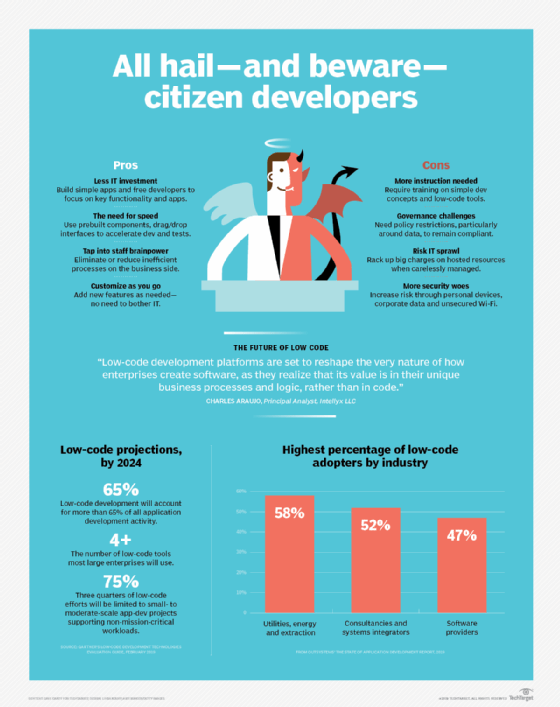
Brian Jackson - Fotolia
Assess the pros and cons of citizen developers in the enterprise
When it comes to citizen developers and no-code/low-code, there really is no one-size-fits-all approach. Determine their value, as well as their limitations, for your specific app development needs.
With the growth of no-code/low-code development platforms and an increased dependency on automation and the cloud, it is no surprise enterprises are now looking within their own ranks to drive efficiency and keep costs low.
No-code/low-code platforms have a graphical interface where users can drag and drop application components. These platforms are aimed largely at citizen developers -- or users with limited software development training -- rather than seasoned development pros. While citizen developers can provide benefits, enterprises should weigh those advantages against the drawbacks.
The benefits
It's no secret software development is expensive. At first, it might make sense on paper to spend six figures on an internal application to support your accounting department. However, the vast majority of that money is being spent on the time it takes an external team to understand the nuances of your processes and design an ideal workflow to maximize usability. The end result will likely be an interface built on top of a basic database back end, which could have been built internally with no-code/low-code tools.
Citizen developers can't create every internal application, but they can create many of them. These developers know more about their own internal standards and procedures than any external team could ever hope to understand.
When an enterprise chooses to go with citizen developers, it's not just about saving money. When pointed in the right direction, citizen developers can take some pressure off internal IT teams, who can then focus on more critical components, such as infrastructure. This can drastically reduce the constant pull for resources that engineering teams often face.
Properly supporting an organization filled with programmer hobbyists can be challenging in the best of circumstances. But if everything falls into place, it can encourage employees to expand their skill sets, while improving productivity.

The drawbacks
Security is always a top priority. While an internal tool isn't nearly as targeted as a public-facing one, it's not unheard of for hackers to exploit internal apps to expand their access.
Without limitations on exactly how these no-code/low-code development platforms integrate into a network, they could easily become a weak link in the chain, given the lack of expertise required to operate them. Enforce tight controls around the initial deployment and management of these tools. In addition, ensure citizen developers receive appropriate security training.
Another drawback of no-code/low-code development platforms is their lack of flexibility. While technically inclined users can often create 80% of an application with these platforms, the remaining 20% can easily require more knowledge or tooling than available.
In addition, consider the cost of maintenance that goes into a new application. Professionally developed applications generally follow industry standards around scalability, speed and management. However, the same can't necessarily be said about applications that citizen developers create. Be sure to think about how these applications can scale -- potentially to support tens of millions of data points -- if needed. Also, establish a strategy for if the company that builds the no-code/low-code tool shuts down.








